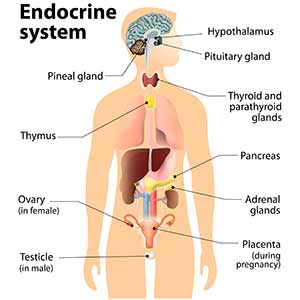An international team of researchers reported that the children of women who ate between one and three servings of fish during pregnancy saw health benefits in later childhood. Women who ate fish more or less often had children who showed more signs of metabolic syndrome and inflammation. The study, partially funded by NIEHS, was published March 2 in JAMA Network Open.
 The new findings align with U.S. Food and Drug Administration and Environmental Protection Agency guidelines that pregnant women eat one to three servings of fish per week.
The new findings align with U.S. Food and Drug Administration and Environmental Protection Agency guidelines that pregnant women eat one to three servings of fish per week.“Fish is an important source of nutrients, and its consumption should not be avoided,” said NIEHS grantee Lida Chatzi, M.D., Ph.D., as quoted in a March 16 press release from the University of Southern California (USC). Chatzi is from the USC Keck School of Medicine and senior investigator on the study. “But pregnant women should stick to one to three servings of fish a week as recommended, and not eat more, because of the potential contamination of fish by mercury and other persistent organic pollutants.”
 Chatzi, a physician and environmental epidemiologist, is associate professor of preventive medicine at USC. (Photo courtesy of USC)
Chatzi, a physician and environmental epidemiologist, is associate professor of preventive medicine at USC. (Photo courtesy of USC)Chatzi and her co-authors wrote that this was the first study they knew of that compared prenatal mercury exposure with metabolic profiles in children, including obesity and insulin measures.
Inflammation may be the link
The team used data from the Human Early-Life Exposome, or HELIX, study in Europe. They analyzed levels of mercury and other pollutants in both maternal and cord blood from 805 women studied between 2003 and 2009. Data on their children were obtained during clinical exams from 2013 to 2016, when the children were ages 6-12 years.
Fish is a good source of omega-3 fatty acids, which modulate the inflammatory response. At the same time, mercury exposure has been linked to inflammation in adults. To better understand the connections between diet, mercury, and child health, the scientists studied proteins called cytokines and adipokines, which are used as biomarkers of inflammation.
They found that changes in certain of these proteins in the mother’s blood were reflected in higher — or worse — metabolic scores in children. Metabolic scores reflected waist circumference, blood pressure, and blood levels of insulin, triglycerides, and high-density lipoprotein cholesterol.
Mercury exposure matters
When the team looked at mercury levels independent of fish consumption, they found a link between higher mercury in a mother’s blood and higher metabolic syndrome scores in her child.
“Fish can be a common route of exposure to certain chemical pollutants, which can exert adverse effects,” said lead author Nikos Stratakis, Ph.D., a USC postdoctoral scholar. “It is possible that when women eat fish more than three times a week, pollutant exposure may counterbalance the beneficial effects of fish consumption seen at lower intake levels.”
In other words, without enough fish and its supply of omega 3, children may be more susceptible to the markers of metabolic syndrome. With too much fish, the mercury exposure may trigger inflammation that counteracts those benefits. “Mercury exposure has been associated with metabolic syndrome, [abdominal fat], and insulin resistance, especially in adults,” the authors wrote.
 Joubert oversees grants in epidemiology and statistical methods development. She also co-leads NIEHS involvement in the Human Heredity and Health in Africa (H3Africa) consortium. (Photo courtesy of Steve McCaw)
Joubert oversees grants in epidemiology and statistical methods development. She also co-leads NIEHS involvement in the Human Heredity and Health in Africa (H3Africa) consortium. (Photo courtesy of Steve McCaw)Bonnie Joubert, Ph.D., from the NIEHS Population Health Branch, noted that the findings from this research study align with current dietary guidelines for fish consumption in pregnancy. “It is important to remember that more of a good thing isn’t always better,” she cautioned. “At the same time, cutting out fish altogether to avoid mercury can negatively affect health later on. The researchers’ intriguing data on inflammation biomarkers helps explain the balance between getting enough anti-inflammatory fatty acids and avoiding too much inflammation from mercury exposure.”
The authors pointed out that theirs was the first human study to suggest changes in particular inflammatory proteins may be the link between fish consumption and mercury exposure in pregnant women and their children’s later metabolic health. “Further studies are needed to replicate these results,” the authors noted.
Citation: Stratakis N, Conti DV, Borras E, Sabido E, Roumeliotaki T, Papadopoulou E, Agier L, Basagana X, Bustamante M, Casas M, Farzan SF, Fossati S, Gonzalez JR, Grazuleviciene R, Heude B, Maitre L, McEachan RRC, Theologidis I, Urquiza J, Vafeiadi M, West J, Wright J, McConnell R, Brantsaeter AL, Meltzer HM, Vrijheid M, Chatzi L. 2020. Association of fish consumption and mercury exposure during pregnancy with metabolic health and inflammatory biomarkers in children. JAMA Netw Open 3(3):e201007.









